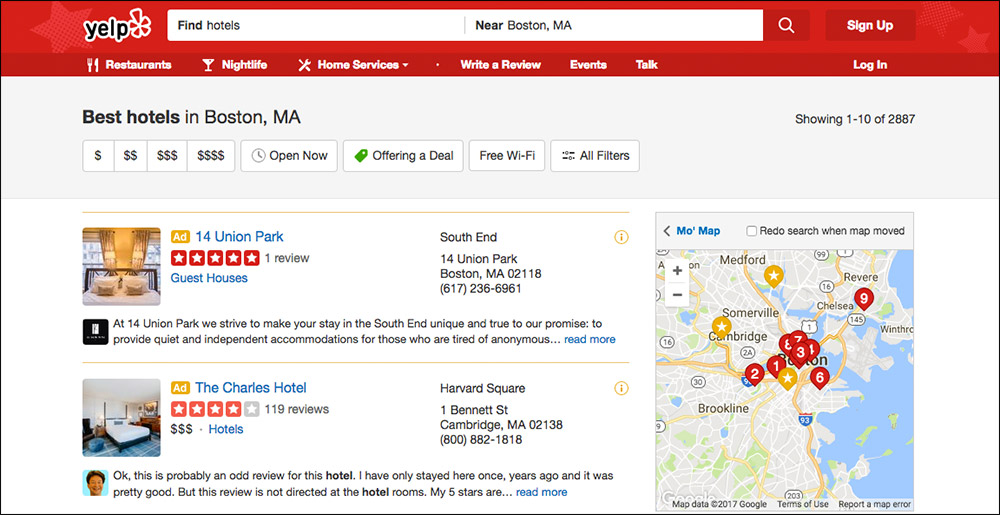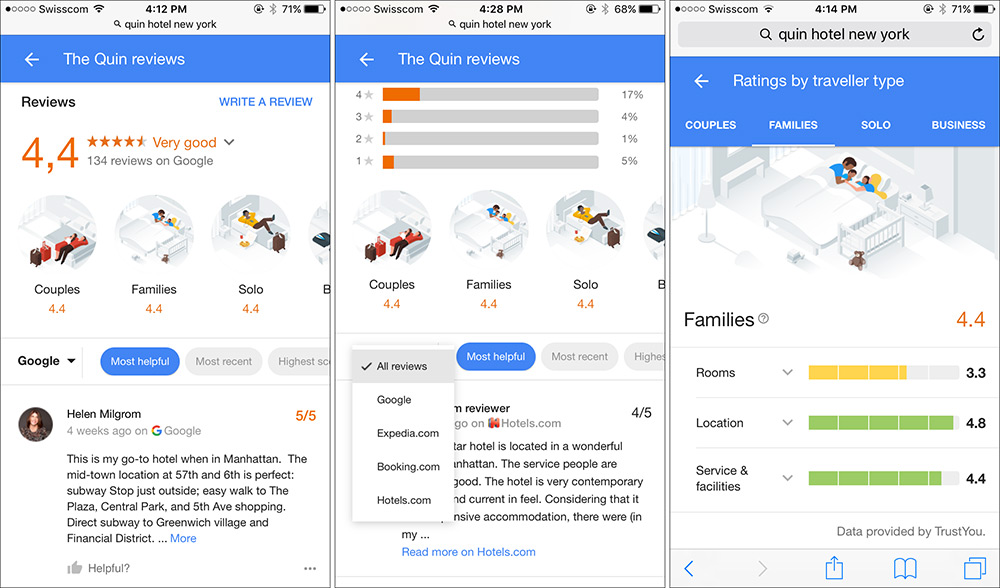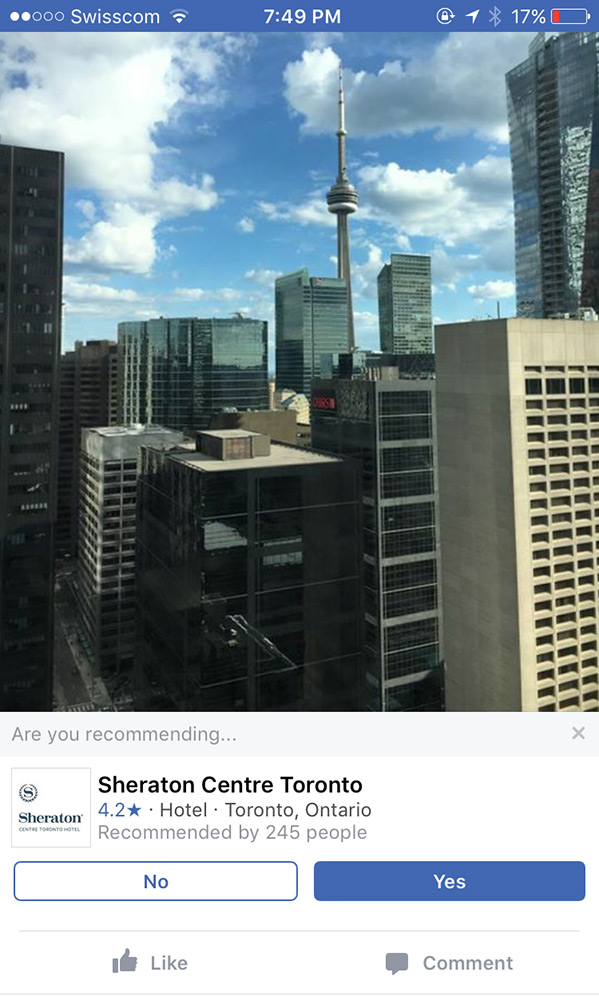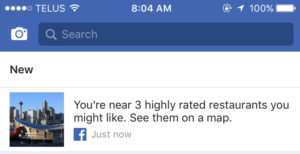
By Ben Hanley
In the digital age, online reviews have become an important digital currency for hotels—the more you have, the stronger your online position. Savvy online travelers frequently make their decisions based on the recommendations of others, and 95% of people say they read reviews before making a booking.
Of all the review sites out there, TripAdvisor is still widely regarded as number one. But things are changing. A number of review sites are now stepping up their prominence in the hotel space. The power of social media is also creating a shift in the way travelers seek out suggestions and tips to inform their booking decision.
In short, being on TripAdvisor alone simply isn’t enough. In the following post, we review the three other major review sites that all hotels should have on their radar and explain the unique benefits each of them offers.
Yelp reviews
With 135 million reviews and counting, Yelp is a platform with serious influence. And with some recent enhancements in business services, it’s now become a platform that’s easier to gain prominence on.
Businesses have always been able to pay for a featured listing at the top of Yelp’s search page, but this used to involve dealing with Yelp directly—hotel marketing managers would have to maintain the relationship with a Yelp account rep. But now, Yelp has started allowing digital marketing agencies to become official “partners.” In this role, official partners act as go-betweens, dealing with Yelp on behalf of the business.
The major benefit for hotels? By working with a Yelp official partner agency, you can take advantage of discounted rates for advertising on the platform, as well as reduced enhanced Yelp profile costs.
On top of this financial incentive, a digital marketing agency can manage a hotel’s PPC bidding, helping them to reach the top of Yelp’s search results page. The process on Yelp works in a similar way to Google’s own cost-per-click bidding model.
As an official partner, the marketing agency can also collect invaluable data from Yelp such as expected ad impressions and the average CPC. All of this can prove invaluable to help increase the success of a marketing campaign.
It’s also worth pointing out that 78% of all hotel-related searches on Yelp are non-brand related (e.g. “hotels in Boston,” instead of the hotel name itself). This means that paying for a premium position for searches can get your hotel in front of guests who don’t know who you are.
In comparison, bidding for non-branded search terms on Google and sites such as TripAdvisor is fierce, and OTAs generally end up coming out on top. So while Yelp may not be the most popular hotel review site out there, it certainly offers a far less competitive space to build awareness.
Google hotel reviews
When Google first started offering reviews, they weren’t all that popular. The number of reviews available was sparse and often anonymous, providing a pretty limited resource for travelers looking to find and compare options.
Today, it’s a whole different story. Google makes $12+ billion per year on advertising from the travel industry alone, and hotel search has become a huge part of its business model. When people turn to a search engine during a hotel search, 81% prefer to use Google.
In a move likely to bolster this dominance in travel, Google has announced the launch of a new graphical interface for hotel search and reviews. This revamped design presents reviews in a cleaner, easy-to-compare format using bold graphics and a flexible array of filters.
For instance, users will be able to filter reviews by demographics including “Families” and “Couples,” and attributes such as “Rooms” and “Location.” This comparative tool will help travelers more easily identify the specific strengths and weaknesses of a hotel. In turn, hotels will be able to better see where improvements need to be made to enhance their reputation.
A carousel of third-party review sites will also let users easily see feedback from different OTAs all in one place—saving them the hassle of trawling through each site independently. In particular, this feature will make it all the more important for hotels to garner quality guest reviews on every site they’re listed on.
This latest innovation is yet another sign of Google’s growing ambitions in the travel space. As such, maintaining strong visibility and having great reviews on Google (and the sites they aggregate) should be considered essential.
Facebook reviews and recommendations
Not to be outdone by Google, Facebook has also invested heavily to boost its own presence in travel. It recently launched a new City Guides app that helps travelers find new hotels, restaurants, activities and tours based on recommendations from friends. A “places the locals go” feature provides additional tips and suggestions from an insider’s perspective.
Facebook has also started allowing users to leave comments and traditional star reviews (one-five) on the hotel page. Importantly, each review is accompanied by the user’s name and profile picture — adding a greater sense of credibility to their comments.
When an individual posts a hotel photo and tags the location in their post, the app will also show a pop-up asking, “Are you recommending (place)?” with the option to provide a simple yes or no answer. For hotels, this integration will make building great relationships and encouraging positive guest feedback all the more important.
This new update from Facebook also represents a major break from traditional review sites, built instead around the power of social recommendations. It’s a smart move. After all, a simple recommendation from a friend or family member naturally carries more weight than feedback from an anonymous reviewer.
In addition, Facebook has been experimenting with recommendations in its user notifications. When a person visits a new destination, they receive a notification with a message like, “You’re near 3 highly rated restaurants you might like. See them on a map.” It’s another clever touch based around delivering personalized suggestions.
Based on Facebook’s track record of investment, it’s likely this particular update will be rolled out into the travel industry. If that happens, we could potentially start seeing it appearing for hotel recommendations as travelers start their planning process.
Thinking beyond TripAdvisor
Hotels are well aware of TripAdvisor’s value and influence. But it’s no longer enough to just have a presence on this one site alone. With an expanding number of online review sites to choose from, a broader and more comprehensive strategy is needed.
Yelp, Google, and Facebook each have their own huge audiences and unique benefits that hotel marketers can exploit. In particular, Google and Facebook are making it easier for travelers to compare and recommend hotels with innovative tools and visually engaging interfaces.
As the travel review space continues to evolve, hotels will need to start thinking beyond just TripAdvisor and look to nurture great reviews across the web.





